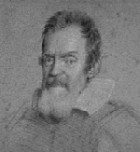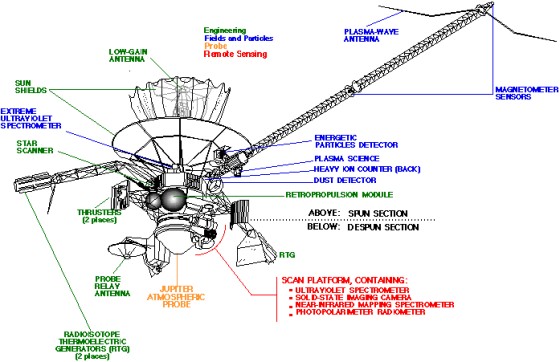
|
Galileo
|
 |

|
Galileo
|
 |
 This web side will show the contributions of the
This web side will show the contributions of the
![]() MPS to that very important
mission to investigate the magnetosphere of Jupiter and to explore the
Galilean moons.
MPS to that very important
mission to investigate the magnetosphere of Jupiter and to explore the
Galilean moons.
| Mission description | |
| Science objectives | |
|
MPS contribution |
|
| Related links | |
| Galileo publications by MPS members |
 The Galileo mission, named after Galileo Galilei (1564-1642) who discovered the 4 big moons (Io, Europa, Ganymede, Callisto) of Jupiter in the 17th century, a joint effort of
NASA and ESA to explore the Jovian system by in-situ measurements. Galileo
is the first man-made spacecraft that is in orbit around an outer planet
in our solar system. All the other 5 spacecraft (Pioneer 10 and 11, Voyager
1 and 2, and Ulysses) only flew by the planet and encountered the Jovian
magnetosphere only for a few days. Galileo, instead, went into orbit around
the largest planet in our solar system in December 1995. After 8 years of exploration
in the Jovian system, the Galileo mission was terminated by sending the orbiter
into Jupiter's atmosphere in September 2003.
The Galileo mission, named after Galileo Galilei (1564-1642) who discovered the 4 big moons (Io, Europa, Ganymede, Callisto) of Jupiter in the 17th century, a joint effort of
NASA and ESA to explore the Jovian system by in-situ measurements. Galileo
is the first man-made spacecraft that is in orbit around an outer planet
in our solar system. All the other 5 spacecraft (Pioneer 10 and 11, Voyager
1 and 2, and Ulysses) only flew by the planet and encountered the Jovian
magnetosphere only for a few days. Galileo, instead, went into orbit around
the largest planet in our solar system in December 1995. After 8 years of exploration
in the Jovian system, the Galileo mission was terminated by sending the orbiter
into Jupiter's atmosphere in September 2003.

The mission consists of an orbiting spacecraft (Galileo Orbiter) and a Jupiter Atmospheric Probe (Galileo Probe) that plunged directly into Jupiter's ionosphere/atmosphere in December 1995.
| © 2009, Max Planck Institute for Solar System Research, Lindau |
Krupp 02-10-2009 |